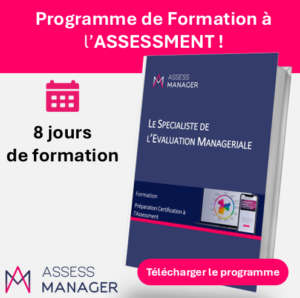MyCampus Management et le coaching d’équipe
Which companies offer managerial diagnostics?
How can we identify managers’ training needs?
How to optimise a training plan or team coaching for managers?
Which organisations use Assess Manager solutions for individual and group assessment and team coaching?
The most common cases are
Public bodies looking to support cultural change.
Private companies:
- Who wish to reduce their staff turnover by improving the skills of their managers, who have an impact on turnover.
- Reaching critical mass and preparing for a new phase of growth.
- Who are merging and seeking to establish a common culture.

Why is it important to assess the level of managers?
Is an expert a good manager?
- On average, a manager manages a budget of €400K a year and a team of 4 to 8 people.
- Managers are often experts who have been promoted to positions of responsibility.
- Being an expert in your field is no guarantee that you have innate management skills.
- Management can be learned, whatever your natural predispositions.
What are the risks of not assessing managers’ managerial skills?
- If an expert promoted to manager does not have the necessary skills to lead his team properly, he may feel overwhelmed.
- He may adopt a saviour approach in all situations by using his expertise, which may limit his legitimacy.
- Employees fail to progress and become demotivated, for different reasons depending on their profile.
The long-term risks are as follows:
- High turnover of top talent.
- Little autonomy for those who stay.
What are the benefits of assessing all your managers and of team coaching?
Managers can get to know each other better, identify their strengths and areas for improvement.
- They can become more aware, question their practices and discover new approaches.
- They feel supported by their employer and valued for their skills.
- They have a desire to progress.
At company level, this offers a number of opportunities:
- Identifying talented managers and discovering new talent.
- Detection of managers in difficulty and the possibility of creating a forum for dialogue.
- Opportunity to support managers using the information obtained.
- Implementation of a training plan targeted to managers’ individual needs. Return on training investment to support the company’s transformation
How do you go about evaluating a team of managers and team coaching?

- Communication plan
Prior communication is essential to reassure teams and explain the overall support process, of which the assessment is the first stage in the training plan.
- Calling in professionals to debrief the results
It is advisable to work with a service provider to carry out the test feedback interviews, offering a confidential and secure environment. Assess Manager offers a list of partners to facilitate this stage, and we are available to help you
- Launching the process: assessing managers
Managers receive an invitation to take the management test.
It takes around 23 minutes to answer the 110 questions and situations proposed.
The results can be consulted immediately.
Managers receive a summary of their results during the interview.
At the end of the interview, they can also receive an initial booklet focusing on a skill identified as a priority for their progress.
Each training booklet includes explanations to better understand the skill, tools and practical exercises.
- Training plan and team coaching
A collective report is automatically generated based on individual results, enabling an initial training plan to be drawn up, highlighting priorities and serving as a basis for developing future training programmes.
Debriefing interviews help to clarify the needs identified.
- A global vision linked to the company’s culture
This global approach provides detailed feedback to senior management on the direction given to managers and the resulting management culture.
If adjustments are required, management has tangible data to support its decisions.
Training priorities for managers are then defined before they are implemented.
- Launch of group training and team coachingsessions
Managers are invited to take part in the training modules that best meet their needs.
The training takes on its full meaning and managers become more involved, making it more effective.
Managers’ progress is tangible and can be measured again a year after the end of the training cycle.

To go further with Assess Manager


